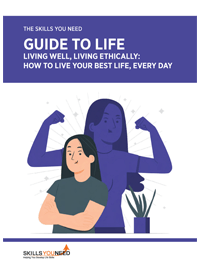Friendliness
See also: Making Friends as an AdultFriendly people are good to be around. They are sociable, pleasant companions, who always know how to say things the right way, even when they are challenging others’ behaviour. They are the natural facilitators in groups, making the social round move more smoothly.
But surely you can’t learn friendliness? Isn’t it an innate talent?
Of course some people are naturally better at friendliness than others, but it is a skill like any other. And like any other skill, it can be developed with self-awareness and practice.
A Definition of Friendliness
friend n. One loving or attached to another, an intimate acquaintance… n. friendliness
friendly adj. like a friend, having the disposition of a friend, favourable, amicable.
Chambers English Dictionary, 1988 edition
The ancient Greeks had words describing four different forms of love, and philia was the love of friends. Aristotle felt that it was usually founded on a common interest or values, and required equality and familiarity between friends. He also equated it with civility.
Medieval philosophers placed it above other forms of love because it contains an element of choice. You can, as they say, choose your friends, but not your family.
In order to have friends, you must first be one.
Elbert Hubbard (1856-1915), philosopher, writer, and proponent of the Arts and Crafts movement
We all want others to warm to us; it is a very basic human desire, probably based on an ancestral need to co-operate in order to survive.
But being a friend, and having friends, requires you to act in a friendly way towards others. It is here that many people fall down and find themselves asking ‘But why don’t I have any friends?’
When to Use Friendliness or Civility?
You might say that you need to be friendly at all times, but Aristotle said that there were certain times when it was even more important.
These are:
When the conversation is going in the wrong direction, that is, someone is getting hurt, and/or would like it to stop, or it is getting very aggressive;
The group needs support to get away from conversational sidesteps or ‘blind alleys’; and
There is a need to steer the conversation towards pleasanter or more constructive topics.
Assessing your Level of Friendliness
How much of a friend are you?
No, not how many friends do you have on Facebook, but how far is your behaviour with others friendly and civil?
There are some simple questions to ask yourself to assess the situation, such as:
How do I behave when others are threatening and/or unpleasant?
Do I:
Praise what they are doing, even when I know it is wrong and potentially harmful to them, me or others? or
Oppose their language and gestures when I know that they are not behaving ‘well’?
Are you comfortable steering a conversation away from unpleasant topics and into happier patterns?
This is not about ignoring any unpleasantness, but separating important topics from the language being used.
Do you accept that sometimes you have to play a moderating role in the social discourse of others?
In thinking through your behaviour, draw on your moral compass and self-awareness to consider whether the way that you behave is ‘right’.
Remember that the way that you show friendliness and civility will differ with different groups and people.
Finding the Right Balance of Friendliness
As with so many personal skills, the key to friendliness is finding the right balance.
In gatherings of men, in social life and the interchange of words and deeds, some men are thought to be obsequious…
those who to give pleasure praise everything and never oppose, but think they should give no pain to the people they meet; while those who, on the contrary, oppose everything and care not a whit about giving pain are called churlish and contentious…
Friendliness is that in virtue of which a man will put up with, and will resent, the right things and in the right way.
Aristotle
Obsequiousness
Those who are too friendly are described as ‘obsequious’ or ‘fawning’. They always say ‘yes’ to those whom they wish to impress, and never tell them that they are wrong or challenge unpleasant behaviour.
A good friend will always speak out when those they care about are doing the wrong things.
There are a number of famous characters from literature who are like this, including Charles Dickens’ Uriah Heep from the novel David Copperfield, and Mr Slope in Anthony Trollope’s Barsetshire Chronicles.
Churlishness
Those who are always unfriendly are called ‘churlish’ or ‘contentious’. They are the people who can never agree with anything. They never have a good word to say about anyone, and are thoroughly unpleasant to be around. They often end up hurting people’s feelings. Challenge is good, in the right place and at the right time. Constant challenge is wearing and unpleasant.
What’s perhaps even more interesting is that those who are obsequious and/or churlish are not just unpleasant to be around, but they never seem to be very happy either.
This may be partly because they are behaving in a way that is not consistent with moral values, or it may just be because thinking unpleasant thoughts is a good way to make yourself unhappy.
The key to finding the right balance is to apply reason.
It’s often hard to apply reason in the heat of the moment. Fortunately, civility is something that you can practice all the time. It will almost never be wrong to be polite and courteous to others.
If there are particular social situations that you find difficult, try thinking through them in advance. Consider what someone acting with friendliness or civility would do, and also what someone over- or under-doing it would do.
It may be helpful here to think of someone you know who has particularly good social skills and use them as a model. If you’re really struggling, you could even ask them for help and pick their brains about how they would approach the situation.
This will give you a reasonable chance of being able to behave with friendliness, especially if you practise at home as well. Like any other skill, practice makes perfect.
Further Reading from Skills You Need
The Skills You Need Guide to Life: Living Well, Living Ethically
Looking after your physical and mental health is important. It is, however, not enough. Maslow’s famous hierarchy of needs suggests that most of us need more than that. We need to know that we are living our ‘best life’: that we are doing all we can to lead a ‘good life’ that we will not regret later on.
Based on some of our most popular content, this eBook will help you to live that life. It explains about the concepts of living well and ‘goodness’, together with how to develop your own ‘moral compass’.


